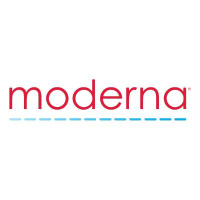
Moderna Inc (MRNA)
NASDAQ

| Strike | Bid Price | Ask Price | Last Price | Midpoint | Change | Change % | Volume | OPEN INT | Last Trade |
|---|---|---|---|---|---|---|---|---|---|
| 54.00 | 10.05 | 11.05 | 16.50 | 10.55 | 0.00 | 0.00 % | 0 | 12 | - |
| 55.00 | 8.40 | 9.85 | 9.65 | 9.125 | -1.12 | -10.40 % | 1 | 6 | 09:56:47 |
| 56.00 | 7.40 | 8.45 | 9.05 | 7.925 | -0.39 | -4.13 % | 3 | 30 | 10:21:21 |
| 57.00 | 7.05 | 7.95 | 13.65 | 7.50 | 0.00 | 0.00 % | 0 | 4 | - |
| 58.00 | 6.30 | 6.50 | 7.45 | 6.40 | 0.00 | 0.00 % | 0 | 84 | - |
| 59.00 | 5.25 | 5.65 | 0.00 | 5.45 | 0.00 | 0.00 % | 0 | 0 | - |
| 60.00 | 4.40 | 4.60 | 5.00 | 4.50 | 0.45 | 9.89 % | 40 | 74 | 13:37:06 |
| 61.00 | 3.50 | 3.65 | 4.25 | 3.575 | 0.23 | 5.72 % | 7 | 50 | 10:21:21 |
| 62.00 | 2.76 | 2.91 | 3.05 | 2.835 | -0.30 | -8.96 % | 7 | 76 | 14:05:35 |
| 63.00 | 2.04 | 2.23 | 2.02 | 2.135 | -0.21 | -9.42 % | 64 | 66 | 15:51:10 |
| 64.00 | 1.44 | 1.50 | 1.47 | 1.47 | -0.18 | -10.91 % | 143 | 222 | 15:47:04 |
| 65.00 | 1.00 | 1.05 | 1.02 | 1.025 | -0.21 | -17.07 % | 791 | 1,005 | 15:53:00 |
| 66.00 | 0.67 | 0.72 | 0.68 | 0.695 | -0.20 | -22.73 % | 1,065 | 1,115 | 15:52:46 |
| 67.00 | 0.44 | 0.47 | 0.46 | 0.455 | -0.14 | -23.33 % | 799 | 3,581 | 15:53:14 |
| 68.00 | 0.28 | 0.30 | 0.30 | 0.29 | -0.14 | -31.82 % | 396 | 1,563 | 15:52:47 |
| 69.00 | 0.19 | 0.22 | 0.22 | 0.205 | -0.08 | -26.67 % | 209 | 1,712 | 15:46:07 |
| 70.00 | 0.13 | 0.15 | 0.13 | 0.14 | -0.08 | -38.10 % | 558 | 6,592 | 15:52:41 |
| 71.00 | 0.08 | 0.11 | 0.10 | 0.095 | -0.07 | -41.18 % | 273 | 1,250 | 15:51:10 |
| 72.00 | 0.04 | 0.10 | 0.08 | 0.07 | -0.03 | -27.27 % | 19 | 959 | 15:35:26 |
| 73.00 | 0.05 | 0.10 | 0.05 | 0.075 | -0.06 | -54.55 % | 41 | 448 | 15:38:59 |
| Strike | Bid Price | Ask Price | Last Price | Midpoint | Change | Change % | Volume | OPEN INT | Last Trade |
|---|---|---|---|---|---|---|---|---|---|
| 54.00 | 0.04 | 0.02 | 0.02 | 0.03 | -0.02 | -50.00 % | 13 | 825 | 12:11:30 |
| 55.00 | 0.02 | 0.05 | 0.03 | 0.035 | 0.00 | 0.00 % | 106 | 207 | 15:32:22 |
| 56.00 | 0.01 | 0.15 | 0.05 | 0.08 | 0.00 | 0.00 % | 0 | 67 | - |
| 57.00 | 0.02 | 0.10 | 0.06 | 0.06 | 0.00 | 0.00 % | 0 | 41 | - |
| 58.00 | 0.03 | 0.09 | 0.06 | 0.06 | -0.07 | -53.85 % | 117 | 1,087 | 15:34:34 |
| 59.00 | 0.09 | 0.11 | 0.11 | 0.10 | -0.06 | -35.29 % | 149 | 452 | 15:38:33 |
| 60.00 | 0.15 | 0.19 | 0.15 | 0.17 | -0.15 | -50.00 % | 73 | 1,727 | 15:50:27 |
| 61.00 | 0.27 | 0.31 | 0.25 | 0.29 | -0.22 | -46.81 % | 183 | 153 | 14:15:28 |
| 62.00 | 0.45 | 0.50 | 0.50 | 0.475 | -0.20 | -28.57 % | 227 | 1,145 | 15:52:16 |
| 63.00 | 0.73 | 0.78 | 0.76 | 0.755 | -0.27 | -26.21 % | 156 | 905 | 15:51:32 |
| 64.00 | 1.10 | 1.19 | 1.17 | 1.145 | -0.34 | -22.52 % | 461 | 784 | 15:52:49 |
| 65.00 | 1.68 | 1.73 | 1.76 | 1.705 | -0.22 | -11.11 % | 229 | 1,306 | 15:52:13 |
| 66.00 | 2.35 | 2.41 | 2.34 | 2.38 | -0.28 | -10.69 % | 146 | 549 | 15:49:40 |
| 67.00 | 3.05 | 3.20 | 3.49 | 3.125 | 0.09 | 2.65 % | 51 | 446 | 15:50:35 |
| 68.00 | 3.50 | 4.05 | 3.85 | 3.775 | -0.07 | -1.79 % | 57 | 542 | 15:22:42 |
| 69.00 | 4.80 | 5.00 | 4.70 | 4.90 | 0.32 | 7.31 % | 56 | 381 | 15:01:06 |
| 70.00 | 5.75 | 5.95 | 5.96 | 5.85 | 0.03 | 0.51 % | 93 | 1,189 | 15:52:18 |
| 71.00 | 6.70 | 6.90 | 6.75 | 6.80 | 0.84 | 14.21 % | 9 | 580 | 15:49:03 |
| 72.00 | 7.00 | 7.90 | 7.77 | 7.45 | 0.77 | 11.00 % | 11 | 207 | 15:35:18 |
| 73.00 | 8.60 | 9.60 | 8.62 | 9.10 | 0.97 | 12.68 % | 4 | 635 | 15:33:01 |

It looks like you are not logged in. Click the button below to log in and keep track of your recent history.